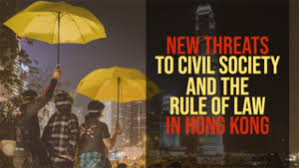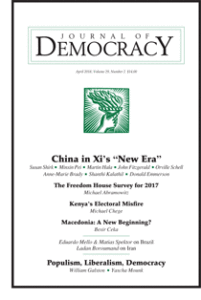For Communist party officials, it was an embarrassing rebuke: as many as 2m residents of a major Chinese city marching to demand the resignation of its Beijing-appointed leader. And because it was happening in Hong Kong they could do nothing about it. Worse still the protest — broadcast globally — was being widely viewed as a celebration of the biggest climbdown in the political career of their boss, President Xi Jinping, The Financial Times reports:
[Chief executive Carrie] Lam’s concession — a move forced upon her by Beijing, say those briefed on the decision — was not enough to satisfy the crowd, which used the rally to call for her resignation. Her U-turn on Saturday and the massive outpouring on Sunday has electrified a new generation of protesters, many of whom had been despondent after a similar pro-democracy campaign, the so-called umbrella movement, failed to secure any concessions from Beijing in 2014. And while Hong Kong remains the only city in China where civil freedoms are protected under the so-called “one country, two systems” arrangement, a majority of seats in its legislature are effectively reserved for pro-Beijing figures. Ms Lam was selected by a similarly skewed election committee.
 “Since the umbrella movement, a lot of people have felt a sense of desperation, helplessness and powerlessness,” says Derek Yuen, a politics lecturer at the University of Hong Kong. “But suddenly they see some light at the end of the tunnel because Beijing has backed down.
“Since the umbrella movement, a lot of people have felt a sense of desperation, helplessness and powerlessness,” says Derek Yuen, a politics lecturer at the University of Hong Kong. “But suddenly they see some light at the end of the tunnel because Beijing has backed down.
“The [protesters] have realized they can stand up to the Communists,” he adds. “This will give them a lot of confidence that they are going to change the situation. [There is] new hope, new spirit and strong confidence.”
Beijing appreciates Hong Kong’s role as an arbitration and adjudication center for Chinese commercial interests, but if the ruling Communist Party has to choose between economic and political prerogatives, it will always prioritize the latter, as it is “obsessed with national unity, sovereignty and party control,” experts suggest.
 “The Chinese government may be worried about the [economic impact on Hong Kong] but always places political considerations above economic [ones], so if it were [to lead to] an economic loss they [would] have to accept it,” said Minxin Pei, professor at Claremont McKenna College, editor of of China Leadership Monitor and a contributor to the NED’s journal of Democracy.
“The Chinese government may be worried about the [economic impact on Hong Kong] but always places political considerations above economic [ones], so if it were [to lead to] an economic loss they [would] have to accept it,” said Minxin Pei, professor at Claremont McKenna College, editor of of China Leadership Monitor and a contributor to the NED’s journal of Democracy.
Radio Free Asia (RFA) was among the National Murrow Award winners named by the Radio & TV Digital News Association (RTDNA). RFA Mandarin’s video “The Women Against the State” (above), earned the distinction in the juried contest’s category of Excellence in Video. The video focuses on the aftermath of China’s “709” Crackdown – a nationwide roundup of lawyers and legal activists that began in July 2015 – and the wives of those still held in custody today.
“This piece, produced by Radio Free Asia’s Mandarin Service, focuses on an important and ongoing issue in China and holds authorities accountable,” said RFA President Libby Liu. “It gives a voice to the women who face severe intimidation tactics from their own government and whose stories are otherwise ignored by Chinese state media.”







